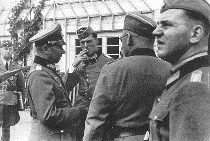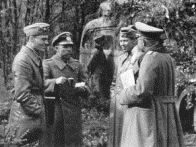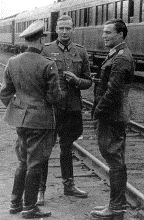![]()
Chapters
References
War and Realization
 Stauffenberg (center, smoking) during the Polish Campaign, 1939  Stauffenberg (left) during the invasion of France, 1940  Stauffenberg (right) in Russia, 1942 |
With the onset of the Second World War, Stauffenberg set aside his distrust of the Nazi regime as he assumed his duties as a staff officer with the Sixth Panzer Division. Stauffenberg would serve with distinction in all of the major offensives of the German army in the early years of the war. The ease of these early victories made Stauffenberg feel that the shame of the Versailles Treaty had been wiped clean and Germany was now free to impose a new order upon Europe. However, his views on a “new order” were different than those of the Nazi hierarchy. “In his view, the war should not lead to a sort of colonization of Europe but to the final elimination of centuries old tensions.”[11] Regardless of these divergent views, Stauffenberg continued to be a model officer and was rewarded for his efficiency with a posting to the General Staff in 1940. His duties now included determining individual battle unit readiness, training questions from the highest to lowest levels of the army, and additionally, he had to deal with fundamental issues such as the buildup of the officer corps. While he found this work less appealing than combat duty he nevertheless poured all his energies into accomplishing his tasks. Lieutenant Colonel Burkhard Muller Hillenbrand, who was Stauffenberg’s immediate superior from April to October 1942, remarked, “His judgment was sound; he appeared sure of himself, and he had a high capacity for carrying on sensible negotiations with all sorts of differing authorities. As a result he became far more widely known than would be expected for one of his age, rank, and position. From the first day to the last, Stauffenberg put into his job all his accustomed concentration and energy. Even when the realization began to grow that the war was threatening to end in immeasurable catastrophe for Germany, he continued to work with the same intensity.”[12] His divisional commander, General von Loeper also stated that, “he never seemed to be able to do enough work."[13] Stauffenberg was also quick to punish those who committed war crimes against the civilian population. An incident during the Polish campaign of 1939 highlights this fact. When two women were arrested for using flashlights, the officer in charge had both of them summarily executed because of fears that they were signaling Allied planes. The truth of the matter was that they were more than likely using said flashlights to navigate their way around in the dark during an artillery barrage. “Outraged, Stauffenberg had the officer in question (who happened to be an old friend) court martialed despite his protests that he had only meant for the two women to be ‘bundled off’ quickly."[14]
Public History at the University of North
Carolina at Charlotte
|
